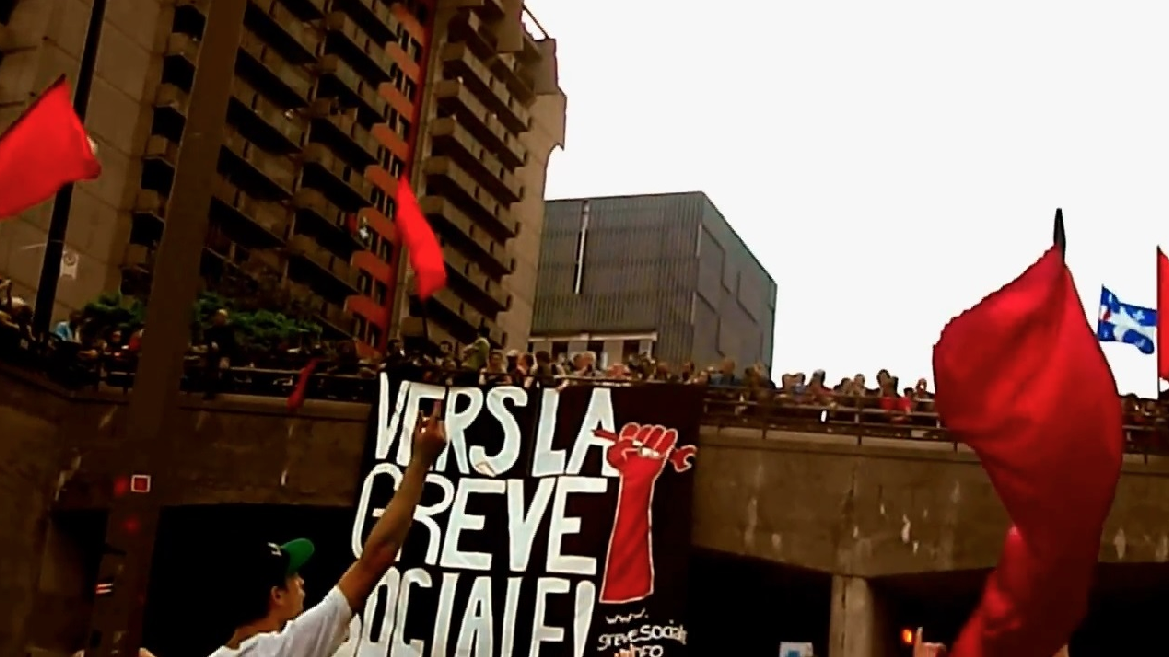Concordia student Karina Licursi’s first documentary streams online in the midst of new protests
March 2012: Students gather in solidarity to protest a proposed hike in tuition fees. At times, protests turn violent and riot police use pepper spray, rubber bullets and tear gas to subdue the masses united in civil disobedience.
March 2015: Masses gather in solidarity to protest government-implemented austerity measures. At times, protests turn violent and riot police use pepper spray, rubber bullets and tear gas to subdue the masses united in civil disobedience.

In what is perhaps a case of “méchant timing,” as we say in Quebec, second-year Concordia film production student Karina Licursi is streaming her full-length documentary film The Student Diaries on the third anniversary of the Maple Spring protests, just as the anti-austerity movement pulls ahead with furor.
“The timing is perfect, because obviously the subject is still important. A lot of the current strike feels like unfinished business from 2012,” Licursi said.
The initial inspiration struck when Licursi was sent out to cover one of the first Maple Spring protests for Dawson’s student newspaper, The Plant. For curiosity reasons alone, she went armed with her camera—a cheap Fujifilm.
“I spoke to students—both Francophone and Anglophone alike—and realized that despite language barriers, clearly this strike was far beyond tuition,” Licursi said.
While Licursi was not striking at the time, her involvement increased when the Dawson Persists group began to organize protests. She then attended them, camera in hard, to sharpen the focus on the angst and frustrations running through the student body like an electric current.
Licursi filmed most of the footage herself, aside from the international clips and news actualities. A short version of the documentary was previewed in a class before Licursi graduated at Dawson. By her account, some students in the class got emotional—tearing up and showing signs of anger.
The rest of the documentary was developed over the course of the next two years. Licursi said that she sometimes stayed up until five in the morning rattling off emails to student unions in an attempt to schedule interviews and gain some insight into the conflict.
The bilingual documentary makes use of several different visual resources: historical archival footage, coupled with professional and mobile phone footage. When assembled, it properly captures the chaos experienced by the hundreds of thousands across Quebec took who part in the largest student protest that North America had ever seen.
According to Licursi, nothing compares to the aforementioned strike that took place on March 22nd. Gathered inside of a restaurant at Place Jacques-Cartier in the Old Port, crowds gathered around a small television that was switched to local news. Helicopter footage revealed at least 200,000 protesters gathered in solidarity.
“I didn’t know whether to cry or be in shock—nothing like this had happened before. There were so many people! When I got home I listened to the song “Beautiful Day” by U2, which it really was,” said Licursi, who is still amused by the people who chose to bring their cars to the rally.
The film draws on commentary from several different parties. Among the interviewees are student group representatives, professors, Martine Desjardins, former FEUQ president and Jeanne Reynolds, former co-speaker of CLASSÉ (Coalition large de l’association pour une Solidarite Syndicale Étudiante). It makes an ample effort to recount the events of the strike, from the preliminary murmuring to the full-scale public demonstrations that were so widely publicized in the media.
However, though Licursi tries to situate and thoroughly explain the causes of the conflict, she does not push an agenda or an opinion in The Student Diaries. She believes that the message is relative to the date of the documentary’s release. It speaks to the obvious notion that history can—and will—repeat itself time and time again, and that social movements and struggle are as tedious as they are rewarding.
“The problem with most social movements is people want to make a miracle and change too much at once, then they burn out,” Licursi said. “As a filmmaker, I want to remind viewers that we did succeed last time—people listened and the [tuition] hike didn’t pass, but not everything will change in one night.”
The preface of the film is the logo for Licursi’s own Carus Productions—a company that is, for a moment, only a vision for the director.
“Right now it’s just a logo at the beginning of my films, but it will eventually grow into something bigger,” Licursi said. As she pursues her social and professional ambitions, as well as she continues to produce film content as a student, Licursi is aiming to one day pay it forward. She hopes that eventually Carus Productions will be able to provide grants for other artists who are struggling to find the means to produce their first feature.
“As someone who’s been there, I think that young directors need more support—especially in Quebec,” she said.
The Student Diaries will be streaming on Youtube on April 1st and 2nd.
For more information on Carus Productions, check out their Facebook page at https://www.facebook.com/CarusProductionsKL.



